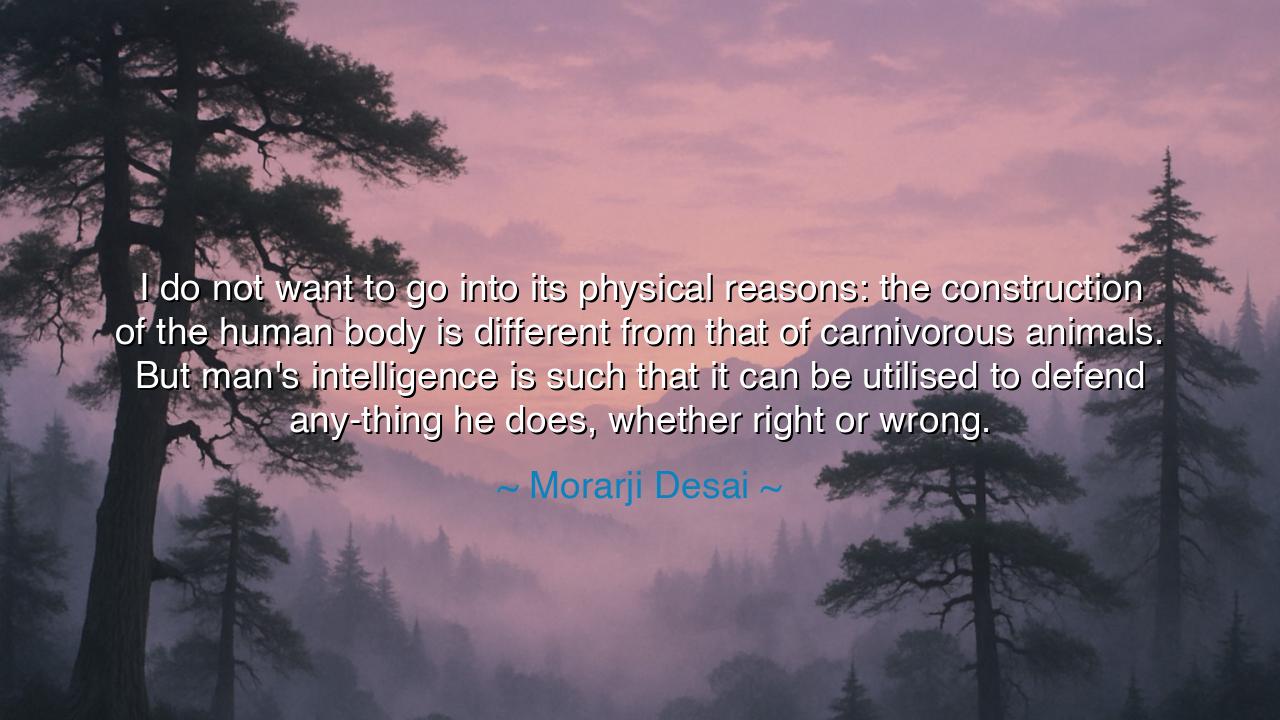
I do not want to go into its physical reasons: the construction
I do not want to go into its physical reasons: the construction of the human body is different from that of carnivorous animals. But man's intelligence is such that it can be utilised to defend any-thing he does, whether right or wrong.






In the thoughtful words of Morarji Desai, one of India’s elder statesmen and seekers of moral truth, there lies a warning as profound as it is timeless: “I do not want to go into its physical reasons: the construction of the human body is different from that of carnivorous animals. But man’s intelligence is such that it can be utilised to defend anything he does, whether right or wrong.” Beneath these calm, reasoned lines beats a deep understanding of the dual nature of human intelligence — that sacred gift which can both elevate and deceive. Desai, a man of discipline and ethical rigor, speaks not only of diet or anatomy, but of the moral paradox of intellect itself — that the mind, so capable of discernment, can also be the finest craftsman of self-justification.
The origin of this quote lies in Desai’s reflections on the nature of nonviolence and human conduct. A devout follower of Mahatma Gandhi, Desai believed that humanity’s greatness lay in its capacity for restraint, compassion, and reason. When he observed that humans are not constructed like carnivorous beasts, he spoke not merely of biology, but of destiny — that the human being, endowed with mind and conscience, is meant to rise above instinct and act with moral purpose. Yet, he warns, this same intelligence, when divorced from conscience, becomes a weapon of self-deception. The mind, ungoverned by ethics, can rationalize cruelty, justify greed, and dress wrongdoing in the garb of reason.
This truth has echoed through every age. Consider the story of Galileo Galilei, who dared to speak the truth of the heavens. The world, blinded by its pride, used intelligence not to seek truth but to defend ignorance. Scholars twisted theology into chains, imprisoning the very wisdom that could have freed them. Such is the danger Desai describes — the mind that turns from light to shadow, using its brilliance not to illuminate, but to obscure. The greater the intellect, the more subtle the deceit when morality is abandoned.
Yet Desai’s observation is not only an accusation; it is a call to self-awareness. He reminds us that the ability to reason is a divine power, but it demands humility. For even the wisest can fall when pride whispers that the end justifies the means. The tyrant, the zealot, the exploiter — all are, in their own eyes, justified. History is full of those who used intelligence to defend the indefensible. The horrors of war, the exploitation of the weak, the destruction of the earth — all have been argued for with eloquence and logic. Thus, Desai’s insight pierces like a mirror before the soul: the question is not can man reason, but will he reason rightly?
In this sense, Desai joins the company of ancient sages who warned that wisdom without virtue is more dangerous than ignorance. The Greek philosopher Socrates taught that knowledge must serve the good, or it becomes corruption. The Indian scriptures too proclaim that true wisdom is not cleverness but dharma — right understanding aligned with compassion and truth. For the mind is a mighty river: if guided, it nourishes; if left unchecked, it floods and destroys. To use reason rightly, one must anchor it in conscience.
The lesson, therefore, is both simple and severe: guard your intelligence as you would guard your soul. When you use it to justify comfort over truth, convenience over compassion, or pride over humility, it becomes your master rather than your servant. Ask yourself, with every decision — is this reasoning born of clarity, or of desire? Do I seek truth, or merely excuse my actions? For the greatest lies are not those told to others, but those we whisper to ourselves in the name of logic.
So, my child of reason and reflection, remember Morarji Desai’s warning. The gift of intellect is sacred, but it is not pure by nature; it must be sanctified by conscience. Let your intelligence serve not the defense of what is wrong, but the discovery of what is right. In a world that glorifies cleverness, dare instead to seek wisdom. Use your reason not to build walls of justification, but bridges of understanding. For only when intelligence bows to morality does it fulfill its divine purpose — not as the shield of self-interest, but as the sword of truth.






AAdministratorAdministrator
Welcome, honored guests. Please leave a comment, we will respond soon